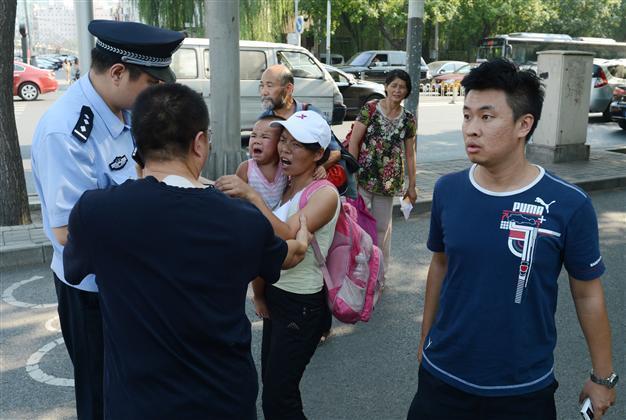Japan, N. Korea in first face-to-face talks since 2008
BEIJING - Agence France-Presse

A woman and child are escorted away by Chinese police after North Korean diplomats arrived for talks with their Japanese counterparts at the Japanese Embassy in Beijing on August 29, 2012. AFP photo
Japan and North Korea met on Wednesday in Beijing for their first face-to-face talks in four years in an attempt to lay the groundwork to overcome decades of mutual distrust.
Ties between the two countries have long been strained, though they periodically try to resume dialogue with the ultimate -- and so far elusive -- goal of establishing formal diplomatic relations.
The talks come as governments and analysts seek clues about the emerging foreign policy of North Korean leader Kim Jong-Un, who took over the communist state after his father Kim Jong-Il died in December.
An official with the Japanese embassy in Beijing who asked not to be named confirmed that the discussions, which Tokyo has said are preparatory and which involve two relatively junior diplomats, had begun.
The discussions were expected to last one day but might stretch into Thursday.
The issues that have long bedevilled Japan-North Korea relations, however, remain largely the same as before so it is unclear how much, if any, progress can be made in the encounter.
Tokyo continues to want further answers regarding the fate of citizens abducted by North Korean agents, amid suspicions in Japan that Pyongyang has failed to provide all the information it has.
Secretive North Korea admitted in 2002 its agents kidnapped Japanese in the 1970s and 1980s to help train spies by teaching Japanese language and culture, and later allowed five of them and their families to return home.
It said another eight died, though many in Japan hold out hope they remain alive. There are also suspicions that Pyongyang's agents abducted more Japanese than was admitted.
Japan says North Korea agreed to reopen investigations into the fate of abducted Japanese when the two sides last met in 2008.
From a security standpoint, Japan also remains wary of North Korea's past ballistic missile tests over its territory or aimed at its airspace as well as underground nuclear experiments in 2006 and 2009 and threats of more.
North Korea, meanwhile, craves trade with Japan yet blasts its military alliance with the United States, colonisation of the Korean peninsula in the first half of the 20th century and treatment of ethnic Koreans in Japan.
The Korean Central News Agency, North Korea's media mouthpiece, in a commentary Tuesday criticised Japan for its past colonialism.
"Japan not only grabbed the territory, culture and natural resources of the Korean nation but deprived Koreans of even their names," it said. "These atrocities were recorded as the most barbarous and disgraceful aggression in human history." Heavily militarised and largely impoverished North Korea, prone to damage from natural disasters such as flooding due to poor infrastructure and deforestation, struggles to feed its people.
Jin Matsubara, Japan's state minister for the abduction issue, said last week that progress could yield big dividends in humanitarian aid.
